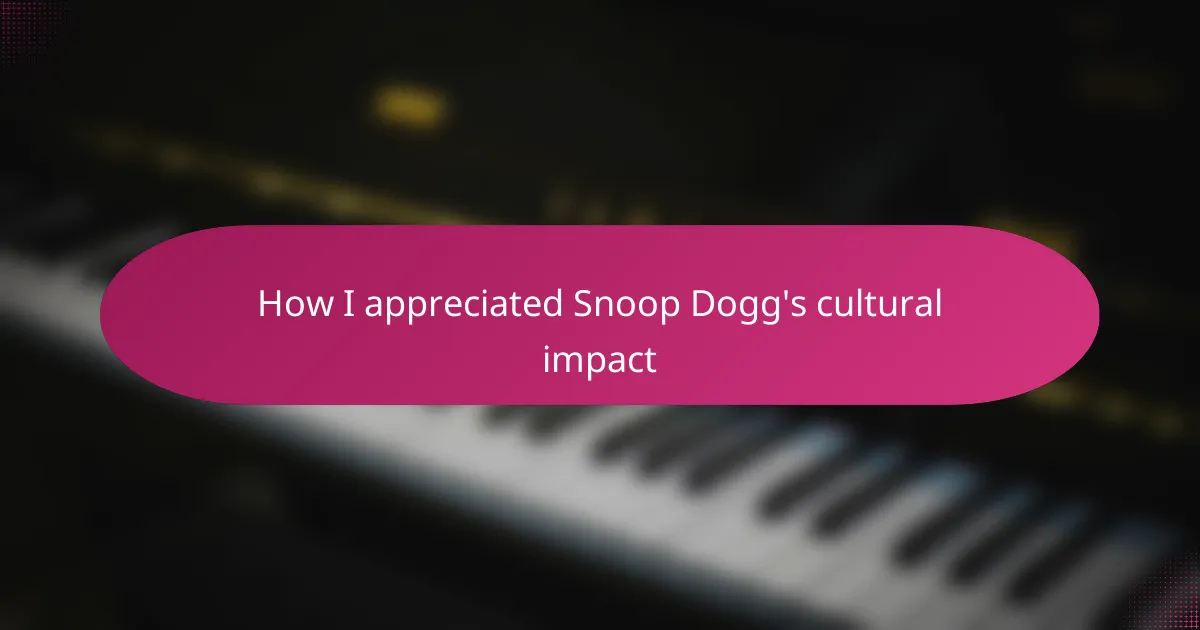Key takeaways
- Snoop Dogg significantly popularized West Coast rap, blending smooth delivery with relatable storytelling, making the genre accessible to mainstream audiences.
- He has maintained his authenticity while evolving with the genre, successfully bridging gaps between different musical styles and generations.
- Snoop’s cultural influence extends beyond music, affecting language, fashion, and social attitudes, showcasing the broader impact of hip-hop culture.
- His legacy teaches the importance of authenticity, versatility, and the value of staying true to one’s roots while embracing change.
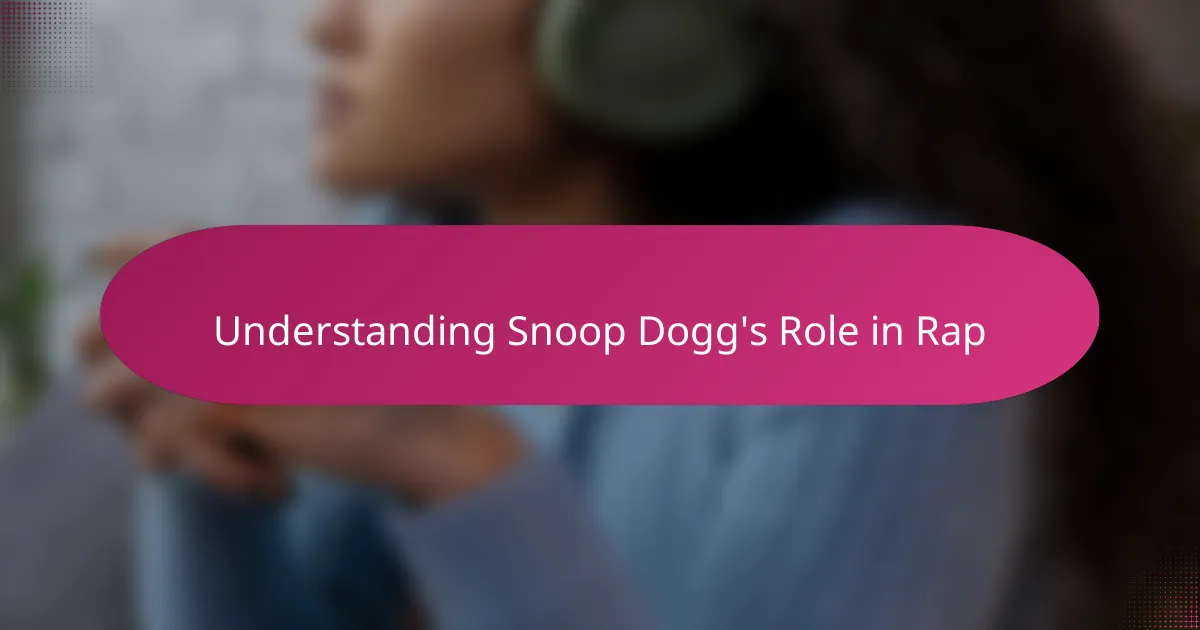
Understanding Snoop Dogg’s Role in Rap
Snoop Dogg’s role in rap goes beyond just his smooth flow and distinctive voice; he brought West Coast rap to the forefront during a time when the genre was still finding its wide audience. I remember the first time I heard “Gin and Juice”—it wasn’t just music, it was an introduction to a lifestyle and culture that felt both laid-back and authentic. Have you ever noticed how Snoop’s style feels effortless yet so influential? That balance is what made him a pioneer.
What fascinates me is how Snoop managed to retain his unique voice while adapting to changes in the rap scene over the years. His collaborations often bridge different generations and styles, showing his deep understanding of the genre’s evolution. Do you think many artists could stay relevant that long without losing their original essence? Snoop’s journey clearly shows it’s possible with the right authenticity and creativity.
Snoop Dogg also played a vital role as a cultural ambassador, bringing rap into mainstream culture without diluting its roots. His charisma and humor gave a different dimension to what rap artists could be. From my perspective, that’s why he resonates with so many people—not just as a rapper but as a symbol of rap’s expanding influence worldwide.

Overview of Snoop Dogg’s Musical Style
Snoop Dogg’s musical style is instantly recognizable, thanks to his laid-back delivery paired with a smooth, melodic flow. I’ve always found his voice to carry a certain warmth that invites you into his stories, almost like he’s having a casual chat rather than just rapping a verse. Have you ever caught yourself nodding along even when the lyrics are complex? That’s the magic of his style—it feels natural and approachable.
What stands out to me is how Snoop blends classic G-funk beats with his distinctive rhythm, creating a sound that’s both nostalgic and fresh. His use of funk samples and deep bass lines gives his music that West Coast vibe, but he never feels stuck in the past. Isn’t it impressive how he manages to stay true to his roots while evolving with the times?
I also appreciate how Snoop’s style incorporates humor and storytelling, making his music more than just beats and rhymes. When I listen to tracks like “Drop It Like It’s Hot,” it’s like he’s painting vivid pictures with words, inviting you to experience his world firsthand. This storytelling aspect makes his style feel personal and real, something I think many artists strive for but few achieve as effortlessly as he does.
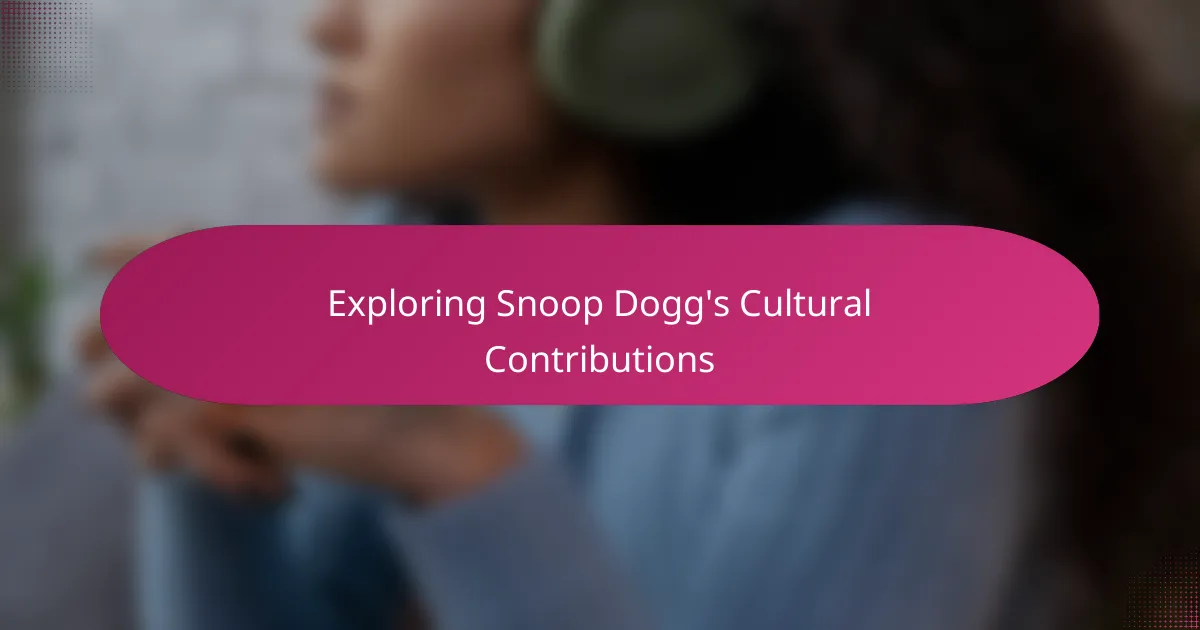
Exploring Snoop Dogg’s Cultural Contributions
What really strikes me about Snoop Dogg’s cultural contributions is how he effortlessly bridges music with broader social elements. He didn’t just pioneer sounds—he shaped attitudes, fashion, and even slang that crossed over into daily life. Have you noticed how phrases like “fo’ shizzle” became part of mainstream conversation? That’s a clear sign of cultural influence.
I also admire how Snoop embraced various media platforms to expand his reach beyond rap. From TV shows to cooking with Martha Stewart, he made sure his personality and lifestyle were relatable to a wide audience. It’s like he invited everyone into his world, breaking stereotypes about what a rapper could be.
In my experience, Snoop’s impact isn’t limited to entertainment; it’s deeply cultural. He gave a voice to West Coast life with authenticity and humor, influencing generations not just through music but through a lifestyle many aspire to understand. Doesn’t that kind of holistic contribution speak volumes about his role in shaping cultural narratives?
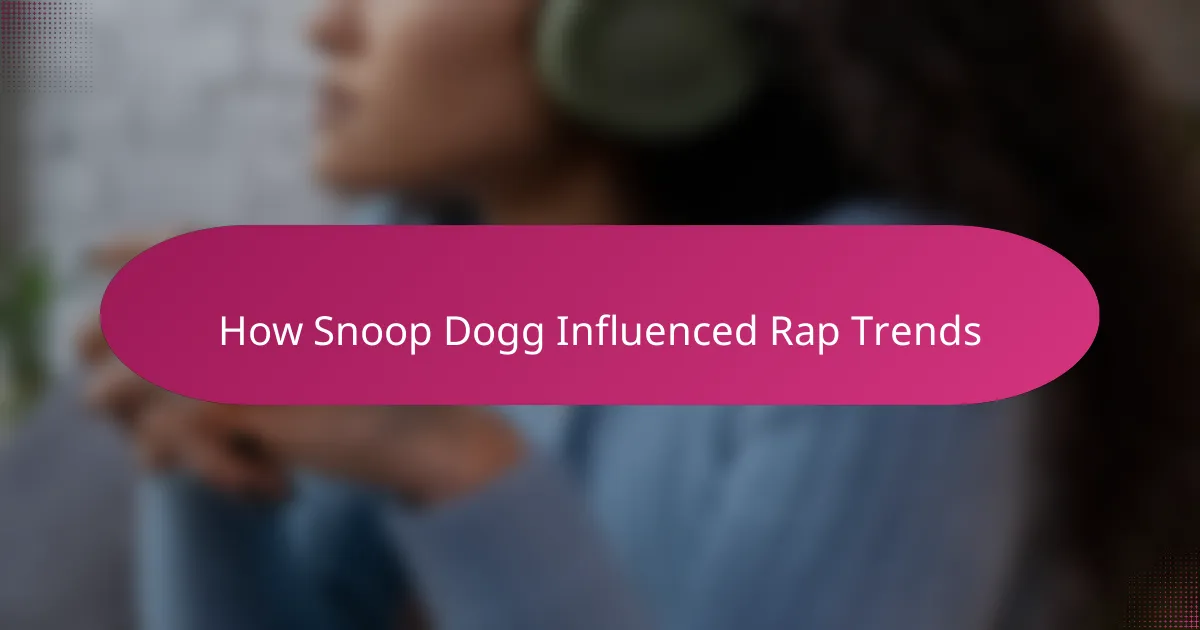
How Snoop Dogg Influenced Rap Trends
Snoop Dogg’s influence on rap trends is undeniable, especially in how he popularized the smooth, laid-back delivery that became a staple of West Coast hip-hop. When I first heard his flow, it felt like a breath of fresh air—relaxed but commanding attention without shouting for it. Have you ever tried to rap with that kind of effortless cool? It’s harder than it looks, and that’s where Snoop set a new standard.
What truly fascinates me is how he introduced and normalized the fusion of rap with funk elements, making tracks groove as much as they rhyme. His knack for blending melodic beats with streetwise lyrics created a blueprint many artists still follow. Isn’t it interesting how a trend started decades ago can still shape the sound of today’s rap?
I also see Snoop as a trendsetter in how he effortlessly shifted between hardcore gangsta rap and more mainstream, playful tracks without losing credibility. That versatility opened doors for rappers to explore diverse themes and audiences. From my perspective, that ability to evolve without betraying one’s roots is a rare gift—what do you think it takes for an artist to pull that off so seamlessly?

Personal Reflections on Snoop Dogg’s Impact
There was a moment early in my own journey with rap music when Snoop’s persona felt like a breath of fresh air—his cool confidence and unique swagger showed me that being authentic could resonate deeply without trying too hard. Have you ever felt that instantaneous connection to an artist, where their vibe just clicks with you? That’s exactly how Snoop did it for me; he made West Coast culture feel vibrant and relatable.
I often think about the way Snoop’s impact transcends just the music itself. It’s in the way he makes you smile with his humor, or how his unique way of speaking seeps into everyday language. Reflecting on that, I realize how rare it is for an artist to influence not only a genre but also everyday culture in such a relaxed, effortless way.
Sometimes I wonder if it’s Snoop’s genuine openness and willingness to embrace change while staying true to himself that marks his lasting imprint. What really strikes me is how he invites listeners—and even those less familiar with rap—to appreciate the richness of a culture that’s both complex and accessible. That, to me, is where his true impact lies.

Lessons from Snoop Dogg’s Legacy
One key lesson I’ve taken from Snoop Dogg’s legacy is the power of authenticity. He never shies away from who he is, and that genuine expression creates a connection that feels real and lasting. Have you noticed how that kind of honesty resonates with people far beyond just the music?
Another thing I admire is his ability to evolve while respecting his roots. It’s rare to see an artist who can adapt to changing trends without losing the core of what makes them unique. From my perspective, that balance requires not just talent but a deep understanding of oneself and the culture you represent.
Finally, Snoop has taught me about the importance of versatility and open-mindedness. Whether it’s through music, media, or simply his larger-than-life personality, he shows that embracing different opportunities enriches your influence. Isn’t that something every artist—and person—can learn from?
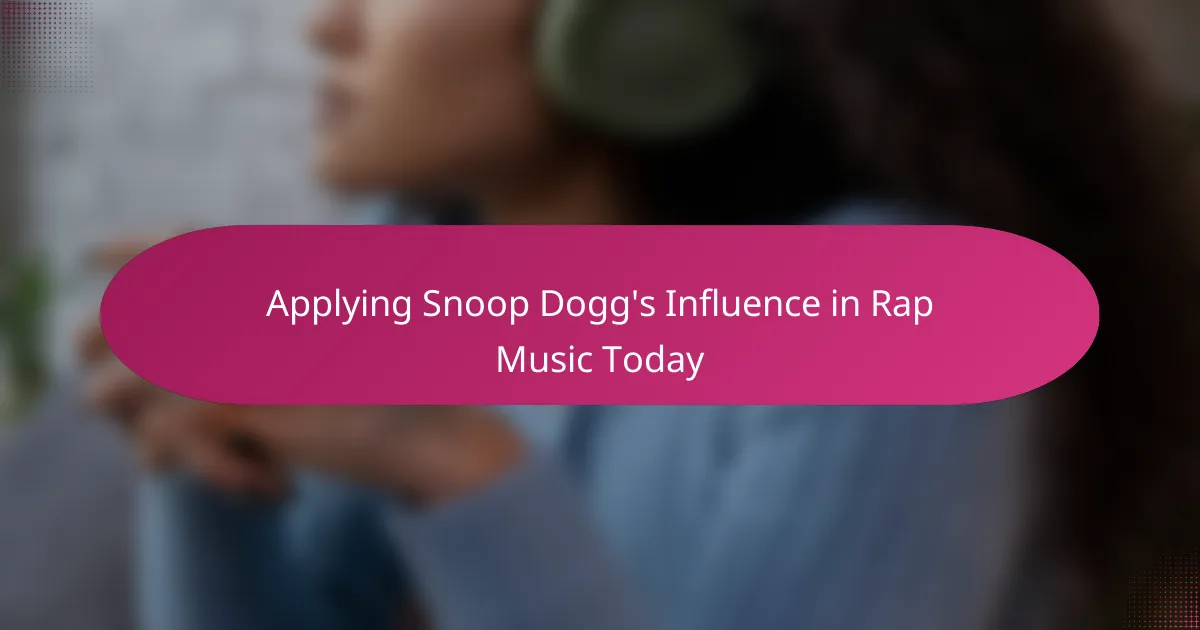
Applying Snoop Dogg’s Influence in Rap Music Today
Applying Snoop Dogg’s influence in rap today means embracing that effortless cool he mastered—a flow that feels like a natural conversation rather than a performance. I’ve noticed many emerging artists try to capture that vibe, but it takes more than technique; it requires a genuine connection to the culture and a laid-back confidence that’s hard to fake. Have you ever wondered why some rappers sound forced when trying to be “smooth”?
What really inspires me is how Snoop’s approach encourages blending genres without losing your identity. Today’s rap scene is full of hybrids—trap meets funk, hip-hop borrows from R&B—and Snoop’s legacy shows that fusion can be authentic and innovative if it’s rooted in respect for the music’s origins. From my experience, artists who borrow his playbook know it’s not just about sound, but attitude too.
Lastly, I see Snoop’s influence as a reminder that rap can be both serious and playful. His ability to switch between gritty storytelling and lighthearted fun invites rappers to explore a wider emotional range. Doesn’t that kind of versatility make the music more relatable? For me, it’s a crucial lesson in keeping the art form fresh and personal.
